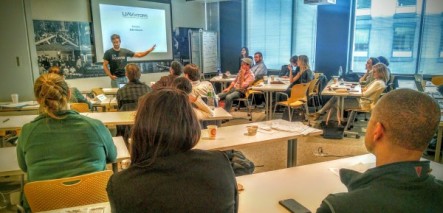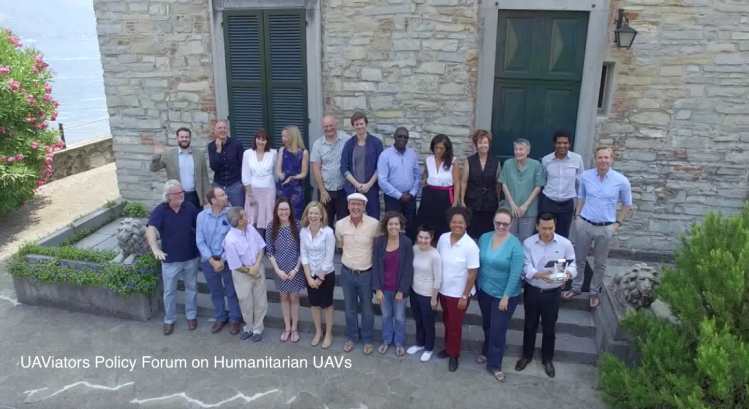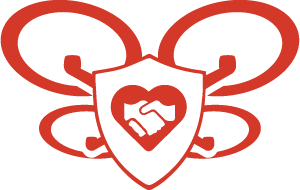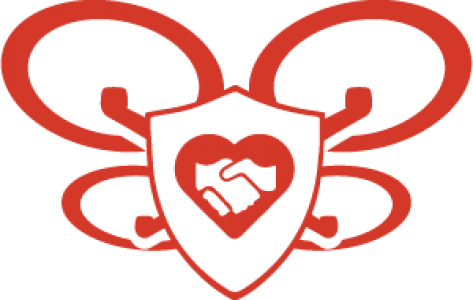2013
In November 2013, Patrick Meier was seconded to UN/OCHA in the Philippines in the wake of Cyclone Haiyan. There he came across an unprecedented number of teams using small UAVs or drones in response to the Category 5 Cyclone. But most of these teams were not sharing imagery with local government or local communities. In addition, most teams were not coordinating their efforts with each other or with relevant humanitarian organizations. To change this, Patrick sought to send the teams a Code of Conduct to inform their operations. Alas, no such document existed, so he subsequently launched the Humanitarian UAV Network (UAViators), drafted a short 1-page Code of Conduct and reached out to more experienced colleagues for feedback.
2014

In March the Humanitarian UAV Network (UAViators) drafted the second version of the Humanitarian UAV Code of Conduct to inform the safe, coordinated and effective use of UAVs in a wide range of humanitarian and development settings. This document was shared widely and publicly disseminated as an open and editable Google Doc to solicit feedback. The Code of Conduct was subsequently revised a dozen times in 2014 and reviewed again at the UAViators Experts Meeting on Humanitarian UAVs held in November at the United Nations Secretariat in partnership with UN Office for the Coordination of Humanitarian Affairs (OCHA).
Participants included seasoned humanitarian professionals from OCHA, UNICEF, UNHCR, UNDAC, IOM, WFP, American Red Cross, European Commission and several other groups that were starting to use civilian UAVs or had a strong interest in leveraging this technology. Several members of the UAViators Advisory Board also participated.
2015

In June UAViators actively solicited additional feedback from dozens of humanitarian organizations. In July UAViators organized an International Policy Forum on Humanitarian UAVs, which was hosted by the Rockefeller Foundation. The purpose of the forum was to further revise the Code of Conduct and to produce additional guidelines identified as priorities during the 2014 UAViators Experts Meeting.
The Policy Forum was attended by experts from humanitarian and development organizations, as well as private companies and academic institutions including UN/OCHA, UNHCR, DPKO, ICRC, ECHO, WFP, American Red Cross, Medair, Humanitarian OpenStreetMap, Cadasta, Peace Research Institute, Oslo (PRIO), Trilateral Research, Harvard University, Texas A&M, Pepperdine University, École Polytechnique Fédérale de Lausanne (EPFL), University of Central Lancashire, ICT for Peace Foundation (ICT4Peace), BuildPeace, DJI and other independent experts.
These Guidelines address four key areas: Data Protection, Community Engagement, Effective Partnerships and Conflict Sensitivity. In August the revised Code of Conduct and Guidelines were again reviewed internally by humanitarian organizations whose  representatives participated in the Policy Forum. This open consultative process, which included dedicated Webinars, culminated with the 2015 UAV Experts Meeting on Humanitarian UAVs, which was co-organized with UN/OCHA, the World Humanitarian Summit (WHS) and MIT in October. The documents were thus revised one more time.
representatives participated in the Policy Forum. This open consultative process, which included dedicated Webinars, culminated with the 2015 UAV Experts Meeting on Humanitarian UAVs, which was co-organized with UN/OCHA, the World Humanitarian Summit (WHS) and MIT in October. The documents were thus revised one more time.
Organizations that participated in the 2015 Experts meeting include the American Red Cross, Direct Relief / NetHope, DJI, Doctors Without Borders (MSF), FHI 360, Swiss Foundation for Mine Action (FSD), GlobalMedic, International Organization for Migration (IOM), UN Population Fund (UNFPA), National Research Council of Canada, Rockefeller Foundation, UN Development Program (UNDP), UN Office for Coordination of Humanitarian Affairs (OCHA), USAID and World Bank.
2016
In February, a final review process involved an executive committee of 5 individuals from different organizations who reviewed and integrated feedback from a broad group of individuals to form the present version of the Code of Conduct and Guidelines. The donor community has vocally expressed their support in this version of the document. It is our sincere hope that donors, UAV operators, humanitarian organizations and development organizations will stand by these guidelines and promote them publicly.

2017
Until 2017, the Code of Conduct was hosted on the UAViators website along with other documents. This dedicated website was created by Joel Kaiser, Patrick Meier and Andrew Schroeder from UAViators and WeRobotics to host and provide greater visibility to the Code of Conduct and supporting guidelines. The goal in 2018 is to add new signatories to this Code of Conduct and to continue promoting these best practices and international standards.

Note that the entire process of developing this Code of Conduct has been an entirely volunteer-driven effort. No funding has been required. We therefore thank everyone who participated in this process for their generous time, commitment and kind contributions.
